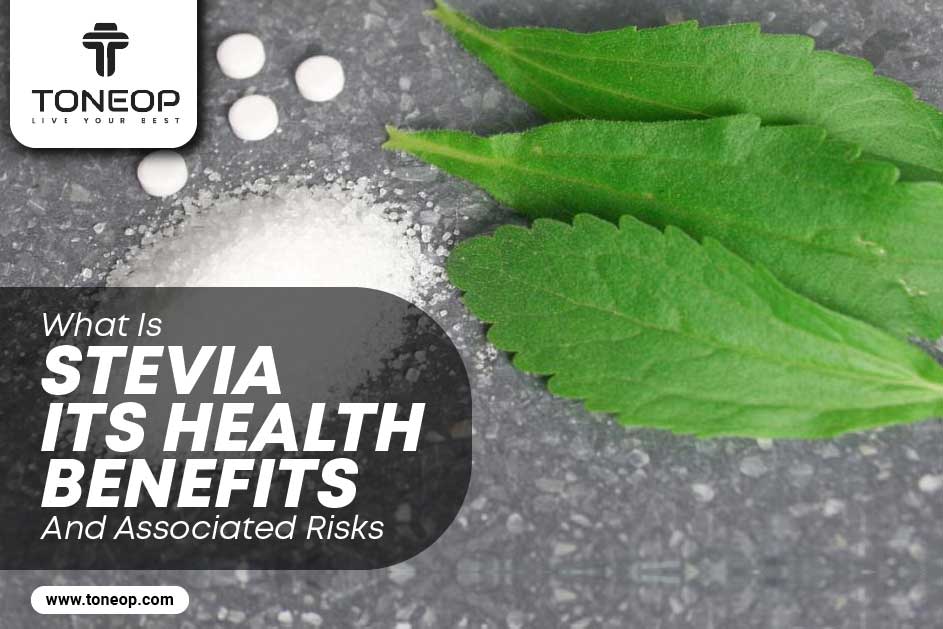What Is Stevia? Its Health Benefits And Associated Risks



Struggling with diabetes but craving sugar? Looking to reduce sugar intake but cannot leave your chai with sugar? Stevia has your back! Stevia's health benefits are coming to the limelight.
Stevia is a natural sweetener extracted from Rebaudiana plant leaves. Due to its zero-calorie nature and intense sweetness, it is a popular sugar substitute for people looking to reduce their sugar intake or replace sugar.
Stevia offers health perks such as improved blood sugar levels, assistance in weight management, and potential antioxidant and anti-inflammatory effects. Read ahead to understand the health benefits and associated risks with stevia.
Table Of Contents
1. What Are The Benefits Of Stevia?
2. Health Risks Associated With Stevia
4. Dietitian's Recommendation
5. The Final Say
6. FAQs
7. References
What Are The Benefits Of Stevia?

Stevia offers various health benefits, like-
1. Calorie-Free
Unlike sugar, stevia does not add calories, making it ideal for those aiming to manage weight or cut calorie consumption.
2. Blood Sugar Regulation
Stevia may assist in controlling blood sugar levels, providing a viable option for individuals with diabetes or seeking to maintain stable blood sugar levels.
3. Weight Control
Stevia has no calories and can curb cravings for sugary treats, supporting weight management efforts by reducing overall calorie intake.
Also Read- 10 Common Weight Loss Mistakes - Oops! You Did It Again
4. Potential Antioxidant Benefits
Stevia might harbour antioxidant properties, which can guard your body's cells against free radicals and oxidative stress-induced harm.
Also Read: Antioxidant-Rich Foods: Types, Sources and Benefits
5. Anti-Inflammatory Potential
Early research suggests that stevia might possess anti-inflammatory characteristics, potentially relieving individuals with inflammatory conditions.
6. Oral Health
Stevia is an excellent sweetener for folks who don't worry about cavities or tooth decay because it doesn't cause those problems like sugar does.
Health Risks Associated With Stevia
Stevia is generally considered safe for most individuals when consumed in moderate amounts. However, there are some possible health hazards connected to its usage, which could include-
1. Gastrointestinal Distress
Taking excessive amounts of stevia or products containing it may lead to gastrointestinal discomfort, such as bloating or diarrhoea. Like other sugar-based alcohols, stevia can ferment in the gut, leading to these symptoms in sensitive individuals.
2. Allergic Reactions
Stevia allergies, though uncommon, can cause symptoms including itching, swelling, or trouble breathing. Specific proteins found in stevia leaves are thought to trigger these reactions.
3. Impact On Blood Sugar
While stevia is often recommended as a sugar substitute for individuals with diabetes due to its minimal effect on blood sugar levels, some research suggests it may still slightly impact insulin secretion and glucose metabolism. This effect could interfere with blood sugar management in some individuals, mainly if consumed in large quantities.
Also Read- Skin Allergies By Food: Symptoms Causes And Treatment
4. Safety During Pregnancy And Breastfeeding
Based on the limited research that exists on the safety of stevia consumption in pregnancy diet and during the breastfeeding period. While moderate intake is generally considered safe, caution is advised, as the effects of stevia on fetal development and infant health are not fully understood.
5. Potential Drug Interactions
Stevia may interact with certain medications, particularly those that affect blood sugar regulation or blood pressure. This interaction could alter these medication's effectiveness or side effects, necessitating caution and medical supervision when using stevia alongside pharmaceutical treatments.
Dietitian's Recommendation
As a dietitian, I suggest using stevia as a natural sweetener in a minimal quantity, especially when it is mainly needed for those who cannot avoid sugar and want to cut down on refined sugar. One should not consider it an alternative to regular sugar but rather replace one's urge to eat sugar. Moderation should always be there because it has its side effects.
Dt. Aditi Upadhyay
The Final Say
There are advantages and some health hazards associated with stevia, a natural sweetener derived from the stevia rebaudiana plant. On the positive side, it offers a sweet taste with minimal calories, making it an appealing option for individuals wanting to reduce sugar intake or manage blood sugar levels.
Moreover, stevia may offer various advantages over certain health complications like diabetes, cardiovascular disease, etc. However, some research indicates possible drawbacks linked to stevia consumption, including digestive issues, concerns about fertility, and potential risks to gut bacteria and metabolism. While stevia can be a helpful tool for promoting healthier dietary habits, it is essential to use it moderately and consider personal health circumstances when integrating it into your diet.
FAQs
1. Is stevia actually healthy for you?
Yes, stevia can be healthy for you as it has zero calories and is an excellent alternative to refined sugar when used in moderation.
2. Are there negative effects to stevia?
Potential negative effects of stevia are-
Stevia or products containing it may lead to gastrointestinal discomfort.
Although rare, allergic reactions to stevia can occur.
It may still have a slight effect on insulin secretion and glucose metabolism.
It can possibly come in contact and react with other medications in the body.
3. Is it OK to eat stevia everyday?
It is generally safe to eat stevia every day. However, moderation should always be maintained. If it is unnecessary, one can avoid having any sugar.
References
- Stevia, Nature’s Zero-Calorie Sustainable Sweetener - PMC (nih.gov)
- Stevia rebaudiana Bertoni.: an updated review of its health benefits, industrial applications and safety - ScienceDirect
About ToneOp
ToneOp is a platform dedicated to improving and maintaining good health through a comprehensive range of goal-oriented health plans with up to 3 Coach support. With a range of Weight Management, Medical Condition, Detox Plans, and Face Yoga Plans, the app also provides premium health trackers, recipes and health content. Get customised diet, fitness, naturopathy & yoga plans and transform yourself with ToneOp.
Leave a Comment
Related Blogs
Explore By Categories
What's holding you back from reaching your health goals?
Connect with our health experts and get free assistance.




















